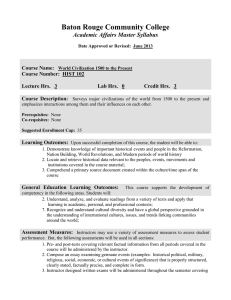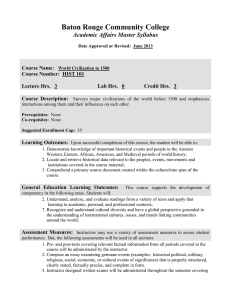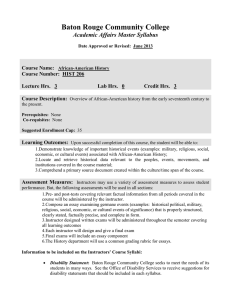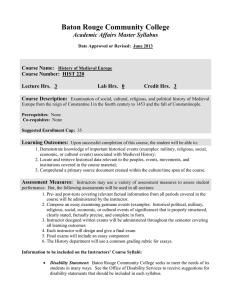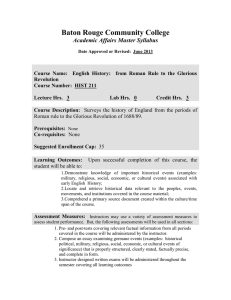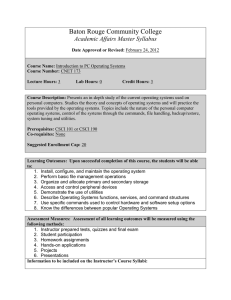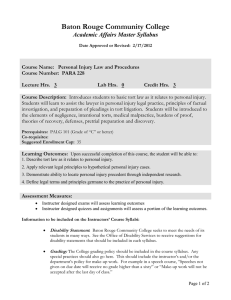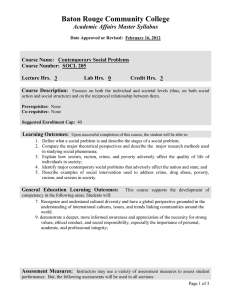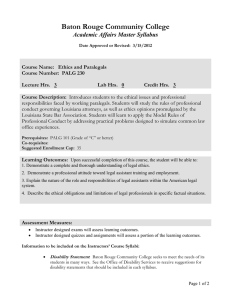Baton Rouge Community College Academic Affairs Master Syllabus
advertisement
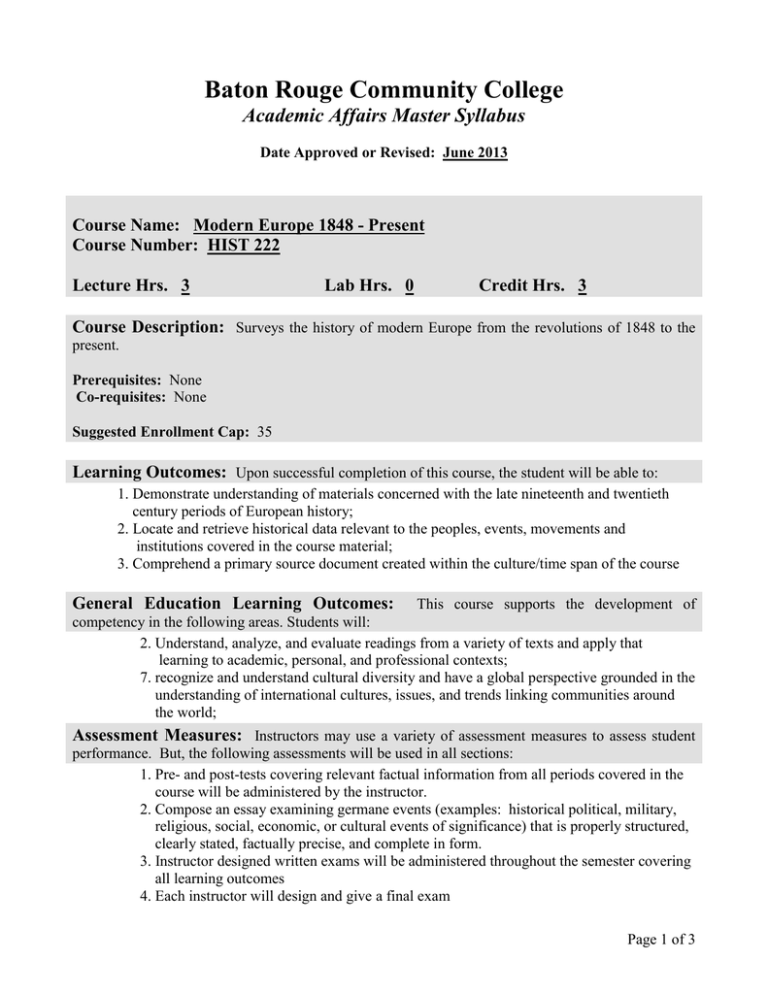
Baton Rouge Community College Academic Affairs Master Syllabus Date Approved or Revised: June 2013 Course Name: Modern Europe 1848 - Present Course Number: HIST 222 Lecture Hrs. 3 Lab Hrs. 0 Credit Hrs. 3 Course Description: Surveys the history of modern Europe from the revolutions of 1848 to the present. Prerequisites: None Co-requisites: None Suggested Enrollment Cap: 35 Learning Outcomes: Upon successful completion of this course, the student will be able to: 1. Demonstrate understanding of materials concerned with the late nineteenth and twentieth century periods of European history; 2. Locate and retrieve historical data relevant to the peoples, events, movements and institutions covered in the course material; 3. Comprehend a primary source document created within the culture/time span of the course General Education Learning Outcomes: This course supports the development of competency in the following areas. Students will: 2. Understand, analyze, and evaluate readings from a variety of texts and apply that learning to academic, personal, and professional contexts; 7. recognize and understand cultural diversity and have a global perspective grounded in the understanding of international cultures, issues, and trends linking communities around the world; Assessment Measures: Instructors may use a variety of assessment measures to assess student performance. But, the following assessments will be used in all sections: 1. Pre- and post-tests covering relevant factual information from all periods covered in the course will be administered by the instructor. 2. Compose an essay examining germane events (examples: historical political, military, religious, social, economic, or cultural events of significance) that is properly structured, clearly stated, factually precise, and complete in form. 3. Instructor designed written exams will be administered throughout the semester covering all learning outcomes 4. Each instructor will design and give a final exam Page 1 of 3 5. Final exams will include an essay component 6. The History department will use a common grading rubric for essays. Information to be included on the Instructors’ Course Syllabi: Disability Statement: Baton Rouge Community College seeks to meet the needs of its students in many ways. See the Office of Disability Services to receive suggestions for disability statements that should be included in each syllabus. Grading: The College grading policy should be included in the course syllabus. Any special practices should also go here. This should include the instructor’s and/or the department’s policy for make-up work. For example in a speech course, “Speeches not given on due date will receive no grade higher than a sixty” or “Make-up work will not be accepted after the last day of class.” Attendance Policy: Include the overall attendance policy of the college. Instructors may want to add additional information in individual syllabi to meet the needs of their courses. General Policies: Instructors’ policy on the use of things such as beepers and cell phones and/or hand held programmable calculators should be covered in this section. Cheating and Plagiarism: This must be included in all syllabi and should include the penalties for incidents in a given class. Students should have a clear idea of what constitutes cheating in a given course. Safety Concerns: In some programs this may be a major issue. For example, “No student will be allowed in the safety lab without safety glasses.” General statements such as, “Items that may be harmful to one’s self or others should not be brought to class.” Library/ Learning Resources: Since the development of the total person is part of our mission, assignments in the library and/or the Learning Resources Center should be included to assist students in enhancing skills and in using resources. Students should be encouraged to use the library for reading enjoyment as part of lifelong learning. Expanded Course Outline: I. Politics and Culture of the Nation-State, 1850-1870 II. Kropotkin, Darwin III. Industry, Empire, and Everyday Life, 1870-1890 IV. Kipling V. Modernity and the Road to War, 1890-1914 Page 2 of 3 VI. Nietzsche, Boxers, Freud VII. War, Revolution, and Reconstruction, 1914-1929 VIII. Sassoon, Lenin, Mussolini, Hitler IX. An Age of Catastrophes, 1929-1945 X. Chamberlain, Goebbels, Truman XI. Remaking Europe in the Shadow of the Cold War, 1945-1965 XII. National Security Paper 68, Beauvoir XIII. Postindustrial Society and the End of the Cold War, 1965-1989 XIV. Glasnost XV. The New Globalism, 1989-present XVI. Amartya Sen Page 3 of 3
